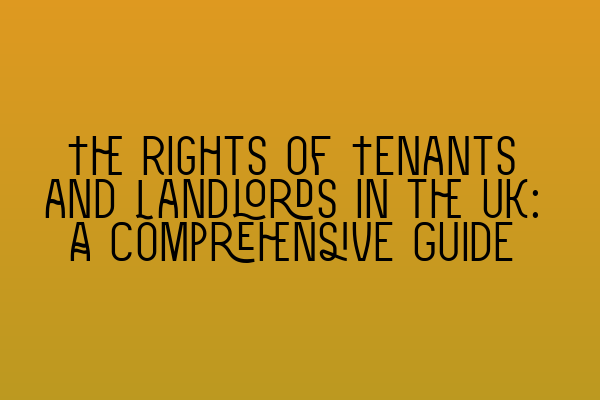The Rights of Tenants and Landlords in the UK: A Comprehensive Guide
As a tenant or landlord in the UK, it is important to understand your rights and responsibilities. The landlord-tenant relationship is governed by various laws and regulations that protect both parties. This comprehensive guide will provide you with all the information you need to navigate the complex world of property law in the UK.
Tenants’ Rights
Tenants in the UK have a number of rights that are protected by law. These rights include:
- Right to a safe and habitable property: Landlords are legally required to provide tenants with a property that is safe, in good repair, and free from hazards.
- Right to privacy: Tenants have the right to enjoy their rented property without unnecessary intrusion from the landlord.
- Right to reasonable notice: Landlords must give tenants reasonable notice before entering the property.
- Right to have repairs carried out: If the rental property requires repairs, the tenant has the right to have these repairs carried out in a timely manner.
- Right to a written rental agreement: Tenants are entitled to a written rental agreement that outlines the terms and conditions of the tenancy.
It is important for tenants to familiarize themselves with these rights and understand how to exercise them. By knowing their rights, tenants can protect themselves from unscrupulous landlords and ensure a safe and enjoyable living environment.
Landlords’ Rights
While tenants have rights, it is also important to acknowledge that landlords have rights as well. Some key rights of landlords in the UK include:
- Right to receive rent on time: Landlords have the right to receive rental payments on the agreed-upon due date.
- Right to evict tenants: In certain circumstances, landlords have the right to evict tenants who are in breach of the tenancy agreement.
- Right to take legal action: Landlords can take legal action against tenants who fail to fulfill their obligations, such as paying rent or causing damage to the property.
- Right to enter the property: Landlords have the right to enter the property for necessary inspections or repairs, provided they give reasonable notice to the tenant.
Landlords should be aware of their rights and understand how to enforce them within the confines of the law. It is essential for both parties to uphold their rights and fulfill their obligations to maintain a healthy landlord-tenant relationship.
Resolving Disputes
Disputes between tenants and landlords can sometimes arise. It is important to know the proper channels for resolving these disputes. In the UK, there are several options available for dispute resolution:
- Mediation: Mediation is a voluntary process where a neutral third party helps tenants and landlords resolve their disputes through negotiation.
- Tribunals: The First-tier Tribunal (Property Chamber) and the Upper Tribunal (Lands Chamber) are bodies that can hear and resolve disputes between tenants and landlords.
- Court: In some cases, tenants or landlords may need to take their disputes to court for resolution.
It is advisable to seek legal advice before pursuing any formal dispute resolution process. This will ensure that you understand your rights and the appropriate steps to take in your specific situation.
Conclusion
Understanding the rights and responsibilities of tenants and landlords is crucial for maintaining a harmonious rental relationship. By knowing your rights, you can protect yourself and ensure a fair and lawful tenancy.
If you have any further questions about tenants’ and landlords’ rights or need legal advice, SQE Property Law & Land Law can provide expert guidance. Contact us today for assistance.
